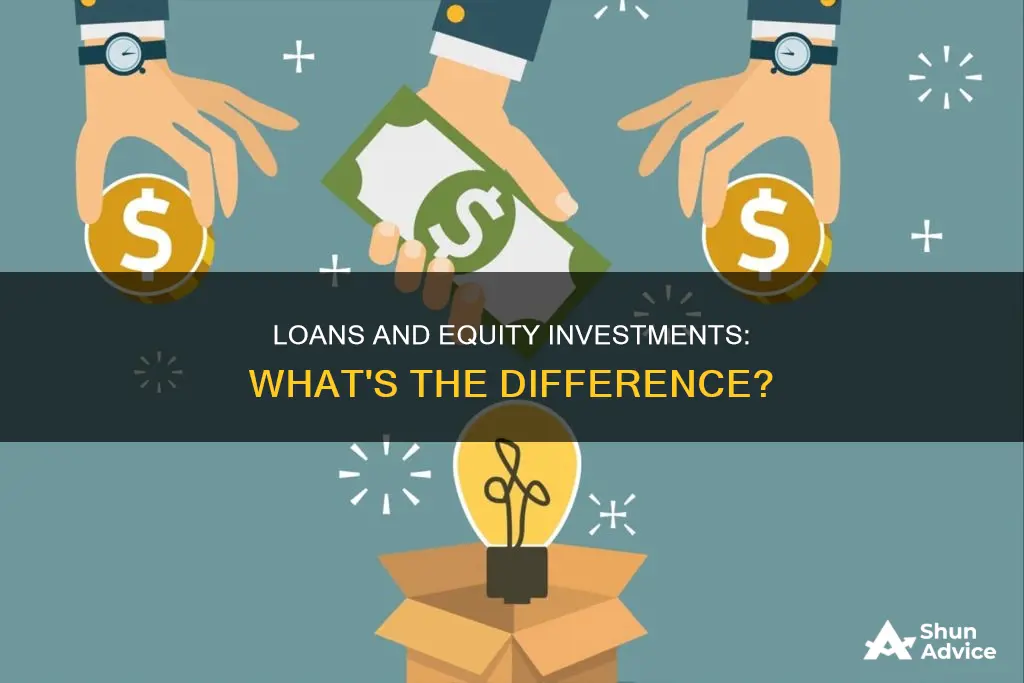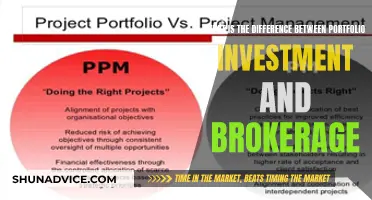
When it comes to funding a new business, there are several options to consider. Companies that are growing fast will almost always need to find outside sources of money. A business loan and equity investment are two of the most common options. A business loan is a form of debt financing, where a company borrows money and repays it with interest. On the other hand, equity financing involves selling a portion of equity in the company in exchange for capital. Equity financing carries no repayment obligation, while debt financing does not require giving up a portion of ownership.
What You'll Learn

Loans are a form of debt financing
Debt financing can come in the form of a term loan for a set amount of time, or a line of credit, where the business can borrow up to a set amount.
The main advantage of debt financing is that the business retains full control. Lenders have no say in how the business is run and are not entitled to any profits. The business only owes the lender repayment of the loan as agreed.
Interest payments on loans can be deducted as a business expense for tax purposes. Also, loan payments are usually fixed, making future expenses easy to forecast.
However, one of the disadvantages of loans is that the business must pay back a steady amount consistently. This can be challenging for new businesses, as profits can be inconsistent.
Additionally, many small-business owners must put up personal property as collateral to secure the loan, putting them at personal risk if the business fails. If the business defaults on the loan, the lender may sue the owner, even if the loan is unsecured.
When deciding between debt financing and equity financing, business owners should consider the maturity of their business, cash flow, and willingness to give up control.
College Student's Guide to Building an Investment Portfolio
You may want to see also

Equity financing involves selling a portion of equity in the company
Equity financing is the process of raising capital through the sale of shares. Both private and public companies use equity financing to raise money for short-term needs or long-term projects by selling ownership of their company in return for cash.
Equity financing can come from friends and family, professional investors, or an initial public offering (IPO). It involves selling a portion of the equity in a company through shares. This can include the sale of equity instruments such as preferred stock, convertible preferred stock, and equity units that include common shares and warrants.
A startup that grows into a successful company will have several rounds of equity financing as it evolves. Angel investors and venture capitalists are commonly the first to fund a startup, and they favour convertible preferred shares rather than common stock in exchange for funding new companies.
Once a company has grown large enough to consider going public, it may sell common stock to institutional and retail investors. If the company needs additional capital, it may choose secondary equity financing options, such as a rights offering or an offering of equity units that includes warrants.
Equity financing is distinct from debt financing. Debt financing involves a company assuming a loan and paying it back with interest. With debt financing, the lender cannot control the business's operations, and the relationship ends once the loan is repaid.
Equity financing, on the other hand, involves selling ownership shares in return for cash, and investors gain an ownership percentage of the company. This means that profits are shared with investors, and some control of the company is forfeited.
Equity financing is a solution when established financing methods are not available due to the nature of the business. Traditional lenders may not extend loans to companies they consider too new or risky, whereas new businesses interest angel investors and venture capitalists, especially if the companies provide growth potential.
With equity financing, companies avoid adding debt and don't have a payment obligation. Companies may also receive valuable resources, guidance, skills, and experience from investors. Equity financing can raise substantial capital to promote rapid and greater growth, making the company attractive to potential buyers.
However, it's important to note that investors assume risk when providing equity financing, so the profits for business owners are reduced. Investors may also want to be consulted whenever the company makes changes. In exchange for the large amounts that angel investors and venture capitalists invest, business owners forfeit a percentage of ownership and control.
The decision between equity financing and debt financing depends on various factors, including the accessibility of funding sources, company cash flow, and the importance of maintaining control for principal owners.
China's Strategic Snub: Why India Loses Out on Investments
You may want to see also

Advantages of equity financing include no obligation to repay the money
Advantages of Equity Financing: No Obligation to Repay the Money
Equity financing offers several benefits to businesses, particularly when compared to debt financing (loans). One of the primary advantages is that there is typically no obligation or requirement to repay the invested money. This feature provides a level of flexibility and financial stability that loans cannot match. Here are some key advantages of equity financing related to this aspect:
No Debt Burden:
With equity financing, the business raises money by selling a stake in the company, usually in the form of shares or ownership interests. Unlike a loan, this injected capital does not create a debt burden for the business. There are no mandatory repayments, no interest expenses, and no fixed schedule of repayments that can strain cash flow. This is especially beneficial for startups or businesses with unpredictable cash flows, as they don't have to worry about making loan payments during periods of financial hardship.
Improved Cash Flow:
Without the obligation to repay loans, the business's cash flow improves. The money that would have gone towards loan repayments can now be directed towards other strategic initiatives, such as research and development, marketing and sales efforts, or expanding operations. This flexibility allows the business to reinvest in itself, potentially boosting growth and profitability.
Long-Term Focus:
Equity investors are typically in it for the long haul, as they seek returns on their investments through the success and growth of the business. As a result, equity financing encourages a long-term focus on value creation. This aligns the interests of the investors and the business, as both parties benefit from sustainable growth and increased profitability over time.
Access to Expertise:
Equity investors, particularly venture capitalists or angel investors, often bring more to the table than just money. They may have extensive industry knowledge, valuable connections, and strategic insights that can benefit the business. Their expertise and guidance can be instrumental in making key decisions, navigating challenges, and seizing growth opportunities. This added value can be a significant advantage, especially for young businesses or those in highly competitive industries.
Shared Risk:
Equity financing distributes risk between the investors and the business owners. Investors share the risk of business failure or underperformance, as the potential loss is limited to their initial investment. This shared risk model can make equity financing more attractive to investors, especially in high-risk ventures, as it offers the potential for substantial gains without personally guaranteeing debts.
Virtual Reality Transforms Investment Management Firm Operations
You may want to see also

Equity investors want a portion of the business profits
When it comes to funding a new business, there are several options to consider. Companies that are growing fast will almost always require outside sources of money. Equity investors can be a great source of capital for businesses, but it's important to understand the pros and cons of this type of investment.
Equity financing involves selling a portion of equity in the company in exchange for capital. This means that investors will own a percentage of the business and will have a say in its operations and decisions. The advantage of equity financing is that there is no obligation to repay the money acquired through it, and it provides extra capital that can be used to grow the business. However, the downside is that business owners will have to give up a portion of their profits and control to investors.
Equity investors typically want a portion of the business profits in return for their investment. This can be a disadvantage for businesses as it takes away valuable company profits that could otherwise be reinvested into the company. It's important to consider the trade-off between gaining capital and giving up a portion of the profits.
Equity investors may also want to be involved in the decision-making process and may want a seat on the board of directors. This can be beneficial if the investors have relevant experience and expertise, but it can also lead to conflicts and a loss of control for the business owners. It's crucial to carefully choose the right investors who share the same vision and goals for the company.
Overall, equity investors wanting a portion of the business profits is a standard part of equity financing. Business owners need to weigh the benefits of gaining capital against the potential drawbacks of giving up profits and control. The decision depends on the specific needs and goals of the business, as well as the willingness of the owners to share ownership and profits.
Bankruptcy: Impact on Your Investment Portfolio Explained
You may want to see also

A loan is a lower-risk investment than equity
When it comes to funding a new business, there are several options to consider. Companies that are growing fast will almost always require outside sources of money. As an investor, it is important to understand the differences between a loan and equity investment.
A loan, also known as debt security, is the most common form of outside capital for new businesses and start-ups. For many companies, taking out a loan is the easiest form of finding capital because the parameters are straightforward. Before investing in a loan, it is important to understand what type of returns you can expect.
Investing in a loan is a lower-risk investment than equity. This is because, with a loan, you are guaranteed to make back your money, plus some. When investing in a loan for a start-up business, your money should be returned to you by a specified date, and you can also gain more money through interest payments. You may also receive steady monthly payments, rather than having to wait for your money to be returned. This can be a high-return investment if done right, but research will need to be put in first.
The main advantage of a loan is that you maintain control over your business. Lenders have no say in your business and are not entitled to your startup business profits. The only obligation you owe your lender is to repay the loan as agreed upon. Because your business owes a lender, this is business debt. There is no personal obligation for the individual members to repay the debt unless they give a personal guarantee.
The biggest disadvantage of a loan is that you must pay back a steady amount consistently. Anyone who runs a business knows that profits can be unpredictable. You may have to make a large loan payment when you need the cash for your business the most. Another disadvantage is that many small-business owners must use personal property as collateral to secure the loan, which puts them at personal risk if the business does not succeed.
Equity financing, on the other hand, involves selling a portion of equity in the company. This means exchanging outside capital for ownership rights in a business. There are no fixed repayments laid out in an equity investment, and most of the time, investors will receive a certain percentage of the profits made.
The main advantage of equity financing is that there is no obligation to repay the money acquired through it. Equity financing places no additional financial burden on the company. However, the downside can be quite large. To gain funding, investors will require a percentage of the company, and profits will need to be shared.
In summary, investing in a loan is a lower-risk investment than equity. It is a straightforward transaction with guaranteed returns, and investors are not exposed to the same level of risk as they are with equity investments.
Exploring Careers in Investment Management: Diverse Opportunities
You may want to see also
Frequently asked questions
A loan is a form of debt financing where money is borrowed and paid back with interest.
An equity investment involves selling a portion of equity in a company in exchange for capital.
Advantages of loans include maintaining control over your business and no obligation to share profits with lenders.
Disadvantages of loans include the requirement to pay back the loan plus interest, regardless of the business's success, and the potential need to provide collateral.







